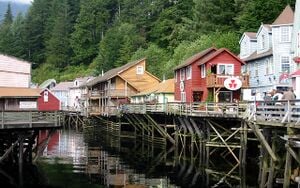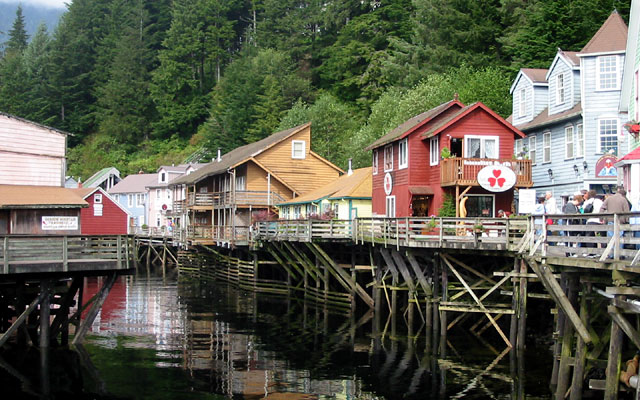The aim of this page is to recognise, celebrate and encourage the self-empowerment of community agency networks (CANs) and community groups across Alaska.

 Veterans of Alaska’s Oil Industry Look to Blaze a Renewable Energy Pathway in the State, insideclimatenews.org (Oct 07, 2024)
Veterans of Alaska’s Oil Industry Look to Blaze a Renewable Energy Pathway in the State, insideclimatenews.org (Oct 07, 2024)  Young Alaskans sue state over fossil fuel project they claim violates their rights, theguardian.com (May 23, 2024)
Young Alaskans sue state over fossil fuel project they claim violates their rights, theguardian.com (May 23, 2024)
Networks and sustainability initiatives[edit | edit source]
- Alaska Center for the Environment
- Alaska Conservation Foundation
- Office of Sustainability, University of Alaska Anchorage
- Office of Sustainability, University of Alaska Fairbanks
- Rivers Without Borders
- Sustainable Alaska, Rice University's Baker Institute
Biodiversity[edit | edit source]
Alaska Wildlife Conservation Center
Coasts[edit | edit source]
Alaska Marine Conservation Council
Community energy[edit | edit source]
Renewable Energy Alaska Project
Cycling activism[edit | edit source]
Wikipedia: Bike paths in Alaska (category)
Food activism[edit | edit source]
Alaska Community Agriculture, Farmer's Markets - Alaska Permaculture
Sustainable transport activism[edit | edit source]
Wikipedia: Hiking trails in Alaska (category)
Resources[edit | edit source]
Citizens data initiative[edit | edit source]
Energy & Environmental Data for Alaska
Maps[edit | edit source]
Map of Renewable Energy Installations, alaskarenewableenergy.org
News and comment[edit | edit source]
2018
- Alaska can save its economy and environment by investing in renewable energy. What are we waiting for? Feb 22, 2018...[1]
2017
What rural Alaska can teach the world about renewable energy, Mar 6[2]
2015
Alaska's quest to power remote villages - and how it could spread clean energy worldwide, August 14[3]
2014
In rainy Southeast Alaska, a village experiments with solar power, December 29[4]
Ice loss sends Alaskan temperatures soaring by 7C, October 17[5]
Worlds First Airborne Wind Turbine to Bring Renewable Energy and WiFi to Alaska, March 25[6]
About Alaska[edit | edit source]
Alaska ( ə-LASS-kə) is a non-contiguous U.S. state on the northwest extremity of North America. It is in the Western United States region. The only other non-contiguous U.S. state is Hawaii. Alaska is also considered to be the northernmost, westernmost, and easternmost (the Aleutian Islands cross the 180th meridian into the eastern hemisphere) state in the United States. It borders the Canadian territory of Yukon and the province of British Columbia to the east. It shares a western maritime border, in the Bering Strait, with Russia's Chukotka Autonomous Okrug. The Chukchi and Beaufort Seas of the Arctic Ocean lie to the north, and the Pacific Ocean lies to the south. Technically, it is a semi-exclave of the U.S., and is the largest exclave in the world.
Alaska is the largest U.S. state by area, comprising more total area than the following three largest states of Texas, California, and Montana combined, and is the sixth-largest subnational division in the world. It is the third-least populous and most sparsely populated U.S. state, but is, with a population of 736,081 as of 2020, the continent's most populous territory located mostly north of the 60th parallel, with more than quadruple the combined populations of Northern Canada and Greenland. The state contains the four largest cities in the United States by area, including the state capital of Juneau. The state's most populous city is Anchorage, and approximately half of Alaska's residents live within its metropolitan area.
The indigenous population of Alaska is proportionally the highest of any U.S. state, at over 15 percent. Close to two dozen native languages are spoken, and Alaskan Natives exercise considerable influence in local and state politics.
References
